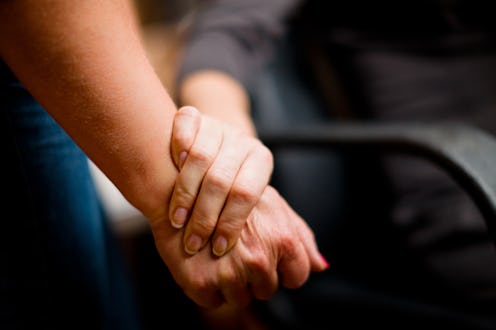
How do you cope with rejection? A bottle of wine and a good pint of ice cream may not be the healthiest way to deal, but it gets the job done. Still, there are expert-approved ways to get over rejection, like asking what you did wrong, not letting your ego get in the way, and remembering that rejection happens to everyone. Now you have another option: Just ask a stranger to slowly stroke your arm. According to a study from University College London published in Scientific Reports, a gentle touch can help you overcome social rejection. This might sound sketchy, but the results are pretty convincing. Researchers told 84 women they'd be playing a computerized game with two other study participants. The participants believed the study was about mental visualization when it was actually about social rejection. Midway through the game, the other participants unexpectedly stopped responding, and the women believed they were being rejected by fellow players. After that crushing blow, the women were blindfolded and touched with a soft-bristle brush. They then expressed how they felt about belonging, self-esteem and control.
"As our social world is becoming increasingly visual and digital, it is easy to forget the power of touch in human relations," says lead author Mariana von Mohr in a press release. "Yet we've shown for the first time that mere slow, gentle stroking by a stranger can reduce feelings of social exclusion after social rejection."
While being touched by a stranger after an embarrassing dismissal is the last thing most of us want to do, it reduced feelings of negativity and social exclusion for the study participants. Before you go to your local coffee shop and ask people to touch your arm, you should know there are some caveats. You need to be touched slowly and gently, and the research team looked at social rejection in one particular setting. One upside: If you have someone in mind you've been wanting to get cozy with (who did not do the original rejecting), now you have an excuse to try to replicate the results.
Fast Touch Isn't As Effective As Slow Touch
Some study participants were brushed at slow speeds, while others were brushed faster. The researchers found that touch won't help as much if it isn't done slowly. A fast, impersonal touch is less effective at reducing negative feelings, according to the study. Senior study author Katerina Fotopoulou says social support is optimally conveyed through a "simple, yet specific, instance of touch." If the person touching you isn't being gentle, you won't get as many soothing benefits.
Touch Doesn't Completely Erase Negative Feelings
If you're facing social rejection, there's no magic cure. Feeling awful after being spurned is an evolutionary response. Back in our hunter-gatherer days, surviving on your own was impossible, so being kicked out of a tribe meant certain death. While being independent is much easier today, the sad feeling remains. Your brain is wired to feel bad after rejection, so it's no surprise that even gentle touch can't fix what you're feeling. Researchers found touch can make you feel better, but it won't get rid of negative emotions completely. That'll take time — depending on the scenario, you could be looking at months or even years before you feel back to normal.
Touch Could Change Medical Care
Per the study authors, previous research has found that gentle touch can help with physical pain. It's even being used in physical and mental health care settings because having a doctor or nurse give a comforting touch as they treat you can be calming. More research is needed on the topic, and future studies may look at skin-on-skin contact along with whether temperature plays a role, the study says. Still, these findings suggest touch can help ease the pain of exclusion, which is a pretty fascinating breakthrough. The next time you get ignored via text or rejected by a potential employer, just ask a pal to gently stroke your arm. It may feel awkward, but the results will pay off.